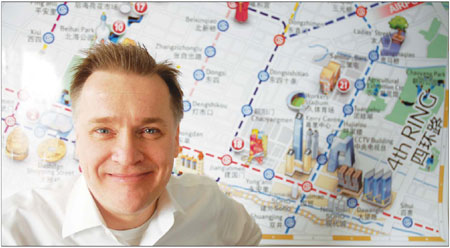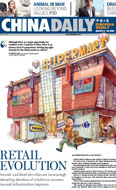Mapping out a plan
Updated: 2011-02-25 10:27
By Alexandra Leyton Espinoza (China Daily European Weekly)
 |
|
Rurik Nystrom's redBANG International supplies customized guides |
Swedish entrepreneur becomes largest supplier of hotel hospitality guides in China
Rurik Nystrom came to China for the first time in 1998 as a project manager for the newly established Ikea store in Beijing. As the son of a Swedish diplomat, he was used to moving from country to country without knowing what to expect when he arrived at the new destination.
So when a group of visitors came to the Beijing Ikea branch he made an information booklet, which pointed to the highlights of the capital.
The booklet was a success and sparked an idea that would trigger a new business and a new way of life. After 14 years of working for Ikea it was time to try to do something different.
"When I started my company there were many ingredients I took with me from Ikea: The most important one was 'low cost'," he says.
In 2000, Nystrom started redBANG International and after a few initial business hiccups redBANG has now grown to become China's largest supplier of hospitality guides, supplying customized guides to hundreds of four- and five-star hotels in 22 cities in China as well as five cities outside China.
Other high-profile clients include Starbucks, DHL, Air France as well as dozens of other service companies, schools and universities.
"The hospitality guides greatly improve a guest's ability to grasp a strange new environment," he says. "The average guests spend more than 50 percent of their stay outside the hotel. This is an excellent way to improve hospitality at a very low cost."
The pocket-sized, customized guides include information about the city and list the top 20 must-see places with useful Chinese words translated into English.
According to Nystrom, hotels can customize all information down to the closest subway exit.
"We live in a society where we are handed small doses of information from friends and colleagues through tweets and SMS," he says.
"We get rid of 90 percent of the places and things we don't need to see and try to make 80 percent of our customers happy. If you try to please everyone by adding everything you end getting those numbers the other way around."
Nystrom says the concierge service that works in certain hotels are manned by staff that speak excellent English, but rarely engage in any of the activities their guests pay to experience. "It's close to impossible for these people to provide good recommendations, especially if they don't know how it feels not being able to communicate in a taxi or restaurant," he says.
Behind the guide's production lies hours of designing, brainstorming and editorial work by a mix of international and locally trained designers and all guides have an illustrated bird's eye view over the city featuring the major landmarks.
"The reason our guides don't use traditional maps is because these can be very hard for first time visitors to understand. An illustrated bird's eye view of a city is so much easier to comprehend," he says.
His team of 12 Beijing staff is expanding and is currently producing a comprehensive guide for some hotels in Xi'an, Shaanxi province.
But the road to success was not easy. When Nystrom first started his company he approached the bookstore industry and hotel gift shops in Beijing with no success. The logistics just didn't work, and the many outlets and different hotel owners made it hard. "We tried the traditional advertising model, but this model was unsustainable as the total amount of work required to identify, sell and collect revenue is higher that the income it generates. The ad sales targeting visitors are simply under developed at present," he says.
The first time Nystrom tried to sell his hospitality guides to hotels in Beijing was not easy either, at that time hotels received traditional maps for free.
But when free maps were no longer subsidized by tourist authorities, Nystrom saw his big chance. Then SARS came along in 2003.
"I thought this was the end for my company, for months nobody traveled to China, so hotels were totally uninterested to buy city guides," he says.
"The unforeseen problems never seemed to stop but I didn't give up and worked even harder on my idea and once SARS was over I tried again," Nystrom says.
The tide of bad luck turned in 2007 and in the lead up to the Beijing Olympic Games business was booming like never before.
The joys of his work are the lessons he learns about Chinese culture. One good example was when he was asked to produce hospitality guides for the Hong Kong Tourist Authority celebration of the 10th anniversary of return to the motherland.
The best visual interpretation of Hong Kong is facing south, but when he sent this design to HKTA for approval before printing 100,000 copies, it asked if Hong Kong could be rotated 180 degrees to face north.
"The HKTA were anxious that if the back of Hong Kong was facing Beijing that this could be interpreted as an impolite gesture," he says.
Nystrom says a big frustration has been copycats. "Nobody likes it when your product is being copied, but luckily our customers are international brand hotels that respect and understand IP issues," he says.
Nystrom enjoys China's unique business environment and believes his idea would have been impossible to start or develop in Sweden.
"The business climate and costs in China made it possible to develop our first products as well as make our first business mistakes," he says.
"Europe and Sweden in particular have very high costs related to all kinds of entrepreneurial activity.
"However it is still much easier to set up and own one's own business in Europe as a foreign citizen than it is to do for a foreigner in China."
This year, redBANG is embarking on a project to produce its first hospitality guide for the iPhone.
So far Nystrom has studied hundreds of iPhone apps produced by hotels and tourist authorities.
"I don't want to disappoint my existing customers by producing a version of what many other companies have already produced. Our vision now is to become the biggest suppliers of hospitality guides for the domestic market in Asia," Nystrom says.
E-paper

Sindberg leaves lasting legacy
China commemorates Danish hero's courage during Nanjing Massacres.
Preview of the coming issue
Crystal Clear
No more tears
Specials

NPC & CPPCC sessions
Lawmakers and political advisers gather in Beijing to discuss major issues.

Sentimental journey
Prince William and Kate Middleton returned to the place where they met and fell in love.

Rent your own island
Zhejiang Province charts plans to lease coastal islands for private investments
